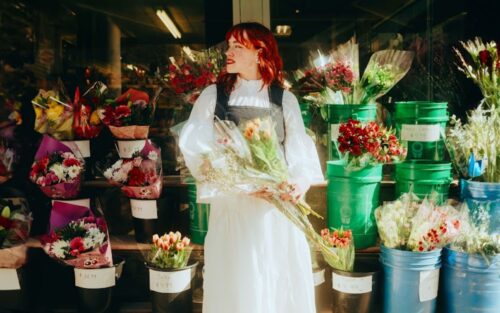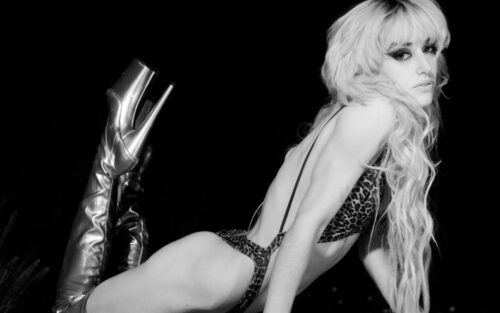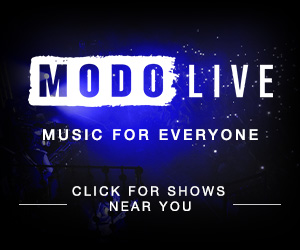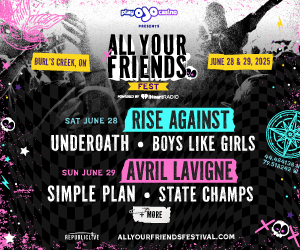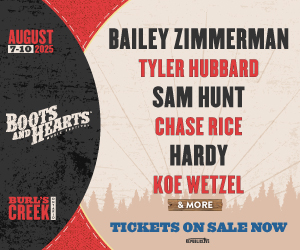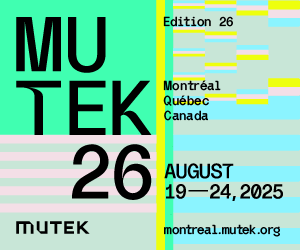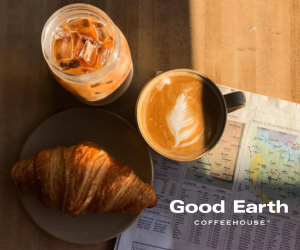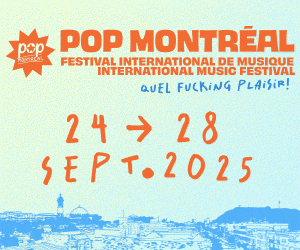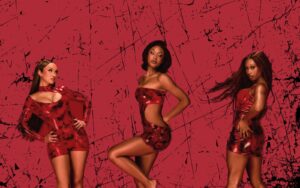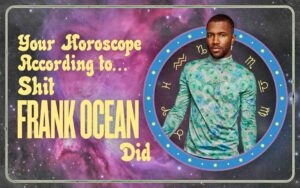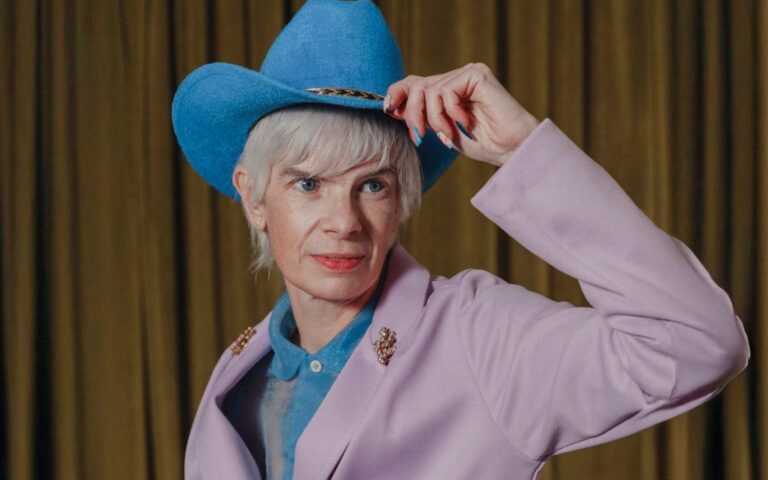
Rae Spoon Revitalizes a Classic on “I've Got Friends In Low Places”
The Calgary artist returns to country to rewrite and reclaim the Garth Brooks track.
by Ben Boddez
Photo by Wynne Neilly
- Published on
Although dabbling in a variety of genres in their recent output, country music has always run deeply in Calgary artist Rae Spoon’s musical veins.
As they prepare to shake things up once again with an upcoming era dubbed Hyper Country – meaning country infused with elements of hyperpop – Spoon figured that the best way to introduce their listeners back to their country origins was with a cover of a classic.
Since Garth Brooks’ original “Friends in Low Places” told the tale of an out-of-place wedding crasher who “showed up in boots,” Spoon dons lavender wedding attire in promotional materials to pay tribute to queer country pioneers Lavender Country. Partly inspired to cover the track by pondering the question “Have you ever been the problem queer or trans at a wedding,” the lyrics are flipped to take on new meaning when sung by someone of Spoon’s background.
“When I came out as transgender in 2001, I never felt the need to lose my love of country music,” they say. “I felt empowered revisiting this song by recording it with a bunch of queer and trans musicians. Right now, being transgender can feel like a low place, but the song reminds us that we just have to find the other people who are also being put there.”
We caught up with Spoon below to talk about wedding stories, their love of hyperpop, and carving out space for under-represented musicians in country music.
When did you realize that this would be a great song for you to cover – from both a musical and a lyrical perspective?
I have been thinking of returning to country music since I heard Lil Nas X’s “Old Town Road.” I knew that there would be an increasing amount of space for under-represented musicians in country music after his amazing contributions to the genre. While I was writing my album that will come out in early 2026, I thought about how a lot of people who might listen to my music don’t remember I was a country artist. I also thought a cover of a classic country song might be the best way to introduce myself to country music fans that haven’t heard of me.
“Friends In Low Places” was a song that my family used to sing (often completely out of the blue and extremely loud) when I was growing up. In a working-class family from Treaty 7/Calgary that had a lot of trauma and physical injuries from logging and oil patch jobs, it felt like an anthem. It made something dire and defeating feel connected and fun.
Re-examining the lyrics made me think the constructs of gender and sexuality that global fascist movements are trying to uphold were starting to push a lot of already marginalized folks into low places. Singing it allowed me to reclaim it and try to make space for people who feel they are in low places to maybe feel unified or represented in the song.
You’ve coined the term “Hyper Country” – what does this musical era mean to you and what can we expect from your future in it?
Hyperpop is a genre that is very popular among trans people. I have a massive amount of respect for the artist SOPHIE and her contributions to pop music. To me she is the genre of hyperpop, and I am sad we won’t see more music from her. I love how she was a maximalist artist and believed that every tool should be used to make music sound big, bright and present. Many people consider hyperpop to be the “most trans” music genre, with a lot of remote collaboration that doesn’t require travel and voice modulation to blur assumptions about gender and singing. I wanted to incorporate some elements of the genre in my next album.
The use of the word hyper also means representations that parody narrow traditional country stereotypes to both reclaim space and call them into question. There are a lot of themes in the songs that aren’t touched upon much in mainstream country music such as exclusion of under-represented people, disability, harm reduction relating to illicit substances and forced treatment, and equality for trans people and sexual minorities. We fuse traditional country instruments with experimental and pop elements to create new approaches to production that I’m very excited about. All of the musicians, engineers, producers and content collaborators are from under-represented groups and most of us are trans/non-binary and/or queer.
We see a lot of wedding imagery here – do you have any wedding stories you were thinking about when recording this wedding-crashing classic?
I grew up in a home where marriage was expected to be straight and cis (my parents married when they were 20 years old) and abstinence until marriage was assumed. It made me think about the expectations of traditional weddings and how there are so many people who’ve been pressured to perform assumed genders and sexualities through clothing or gender roles (including me). It also made me think about weddings I’ve been to where one or both families don’t know that the bride or groom is queer or trans and who they dated is in attendance (also has happened to me). When Google Images made a reel of the videos and photos from the shoot and congratulated me on getting married, I knew we had done something that really messes with expectations of sexuality and gender.

I love the shoutout to Lavender Country – for the uninitiated, what makes Lavender Country so special to you and what should people know about them?
Patrick Haggerty, the founder and lead singer of Lavender Country, was an elder in the LGBTQ music community. In 1973 he recorded and released a self-titled album that is thought to be one of the first gay country albums recorded by gay people. I first heard of him in 2016 when the documentary about him (These Cocksucking Tears) screened at the same festival as a documentary about me (My Prairie Home) and my director friend Chelsea McMullan introduced me to his music.
I had the good fortune of playing a show with Lavender Country in Seattle before he passed away in 2022. His music and stories were captivating, and he had palpable joy that came across in his performances. When I decided to return to playing country music, I wanted to pay homage to Patrick as an ancestor. I started to incorporate lavender into a lot of my fashion and photography colour themes. It would be cool if the LGBTQ2S country genre was called “lavender country” in honour of Patrick.
What have you been listening to lately?
Laurie Torres, Genital Shame, Doechii, Kim Gouchie, Piqsiq, Kacey Musgraves, Kimmortal, Louis Sanchez, Little Window, Cassia Hardy, Little Window, Ky, Thanya Iyer, LAL, Betta Lemme, Lhasa, Ribbon Skirt.
What’s next for Rae Spoon? Anything else you’d like us to know?
I’m working on a full-length country album to release in early 2026 called Hyper Country with producer Alaska B (Yamataka Sonic Titan) and a band of trans, non-binary, queer, Disabled and otherwise underrepresented people.
My pop country band Big Riverz will release a single on July 14 called “Heat Goes Up.” Everyone else in the band lives in the UK and I’m excited for people to hear how our collaboration makes upbeat, pop country.
In fall 2026 my next book, Cancer Person, will be published by Arsenal Pulp Press. It traces my health journey as a trans person who went through cancer treatment and extensive complications in a system that wasn’t equipped to respect my human rights.
By Ben Boddez
The Toronto-based pop artist pens an ode to defeating online jealousy that sounds fresh out of the early 2000s.
By Cam Delisle
Just in time for her L.A. Pride debut, the alt-popstar drops the visual for “Versed”—a sweaty anthem that pulses with desire.


